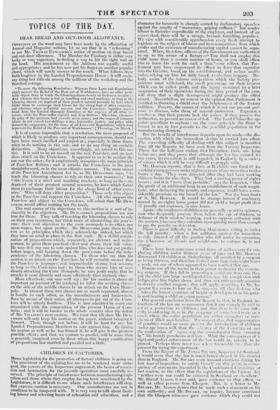TOPICS OF THE DAY.
DEAR BREAD AND OUT-DOOR ALLOWANCE.
OFFENSIVE as the word may have been made by the affectation of Annual and Magazine writers, let us say that it is " refreshing" to see Mr. THOMAS DUNCOMBE'S notice of motion on dear bread and out-door allowance. The Member for Finsbury is either very lucky or very sagacious, in finding a way to hit the right nail on the head. His amendment to the Address was equally useful and appropriate; and he has now put his finger on another popular chord, which will surely answer to the touch. What billows drew forth laughter in the Landed Preponderance House : it will excite any thing but ridicule among the millions of the workshop and the thatched cottage.
" To move the following Resolution : Whereas those Laws and RegtilatiOlF, which prevent the Relief of the Poor out of Workhouses, have no other justi- fiable object than to tench the labouring classes to rely on their own resource:: And whereas this lesson is but an insulting and cruel mockery, so long as the labouring classes are deprived of their greatest natural resource by LON'S which forbid them to exchange their labour for the cheap food of other countries: mid whereas, when unfruitful seasons and the Corn-laws together render bread dear, the Landed Monopoly flourishes at the expense of all other in- terests, while the Poor suffer especial and deep distress : Therefore, whenever the price of the quartern loaf exceeds seven pence, and the wages of common labour do not exceed two shillings a day, humanity, justice, and policy alike demand the suspension, for the time, of all Laws and Regulations which tend toprevent the Relief of the Poor out of Workhouses." [Thursday, 7th March.]
It is of course impossible that a resolution, the mere proposal of which is likely to produce very important consequences, should not have been much cavilled and carped at ; especially in these times, when to do nothing is the rule, and to do any thing an enviable
distinction. Many objections, accordingly, are raised to this no- tice. It is said to be an assault on the new Poor-law, and an insi- dious attack on the Corn-laws. It appears to us to be neither the one nor the other ; for it emphatically recognizes the main principle of Poor-law Reform; and it attacks the Corn-laws in the most straightforward, as in the most effective manner. The main object of the Poor-law Amendment Act is, as Mr. Dexcostan says, "to teach the labouring classes to rely on their own resources ;" but "this lesson is a cruel and insulting mockery, so long as tiny are deprived of their greatest natural resource, by laws which forbid them to exchange their labour for the cheap food of other coun- tries." Who will deny either proposition ? Those only who object to the Poor-law and support the Corn-laws. All who support the Poor-law and object to the Corn-laws, will admit that Mr. Dux- COMBE would affirm nothing but the truth.
The real source of the objections to this motion is a sort of in- sincerity in the objectors. Mr. Duxeosinifs propositions are too true for them. They talk of teaching the labouring classes to rely on their own resources, but think more of diminishing the poor's- rate : their real objection to the corn monopoly is its effect, not upon wages, but upon profits. Mr. DiNw»112E puts them to the test as to principles, which they acknowledge indeed, but which they have no mind to place in the first rank. By a skilful combi- nation of propositions which, separately, arc abstract and unim- portant, he gives them practical effect and shows their full value. He may defy any one to vote against hint, who does not put profits before wages, and keeping down the poor's-rate before the inde- pendence of the labouring classes. To those who say that his motion is an attack on the Poor-law, he will probably answer that the Poor-law is improper, and impracticable during bad seasons, so long as the Corn-laws last : to those who accuse him of insi- diously attacking the Corn Monopoly, he may justly reply, that he attacks it more directly and more effectively than anybody else. More effectively, one may well say ; for his motion is above all important on account of its tendency to inlist the working classes on the side of the middle classes in an attack on the Corn Mono- poly. At present these two classes arc as much separated, almost as hostile to each other, as the manufitcturers and landowners. Save by means of their union, all attempts to get rid of the Corn- laws will be utterly fruitless. This is now admitted by ever' one acquainted with the composition of the present !louse of Com- mons : and it will be known to the whole country after the defeat of Mr. Vii.mints's next motion. We trust that till then Mr. Dux- COMM.: will only keep his motion On the paper, without bringing it forward. Then, though not before, it will lie hard for any but Landed Preponderance Members to vote against him. By timing his motion as well as lie has framed it, he will give it the greatest possible effect ; and that, we venture to predict, will be more than is generally imagined even by those whom this happy combination of propositions has startled and puzzled not a little.


























 Previous page
Previous page